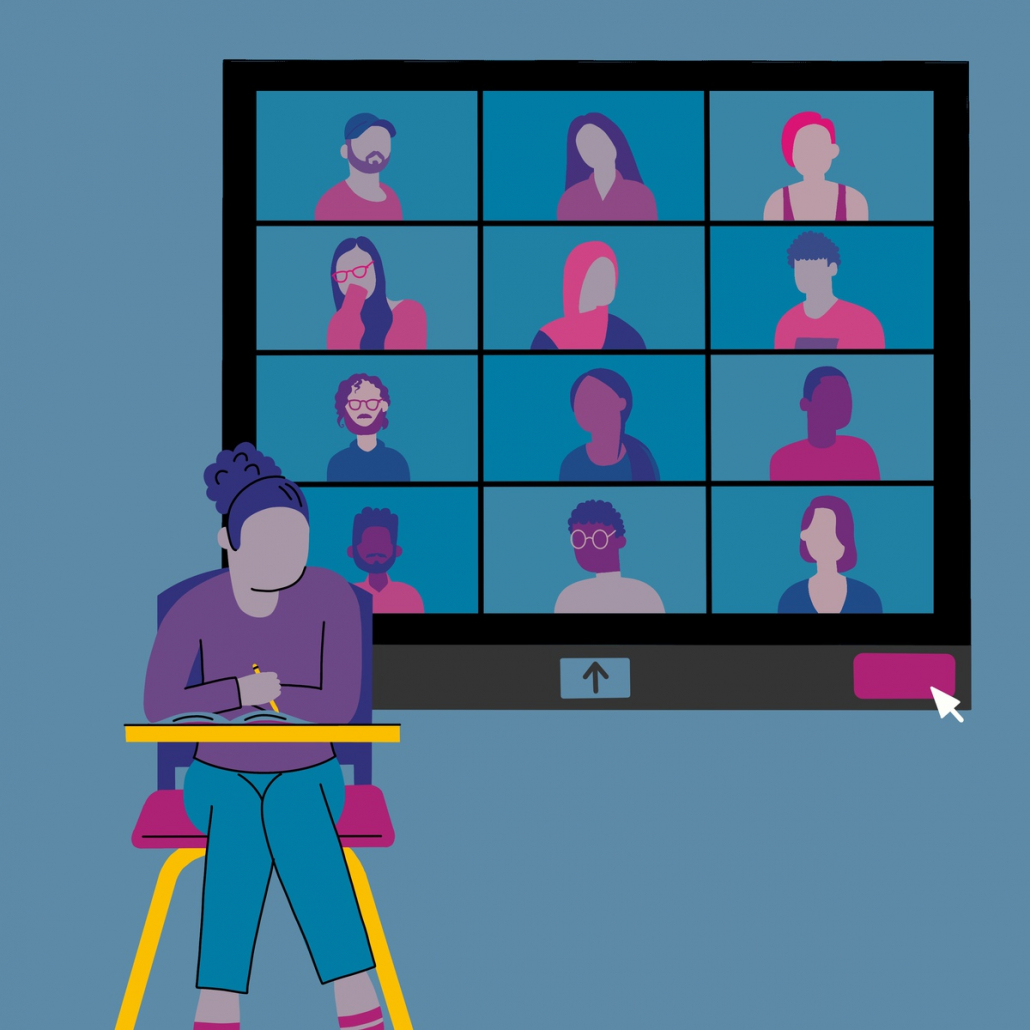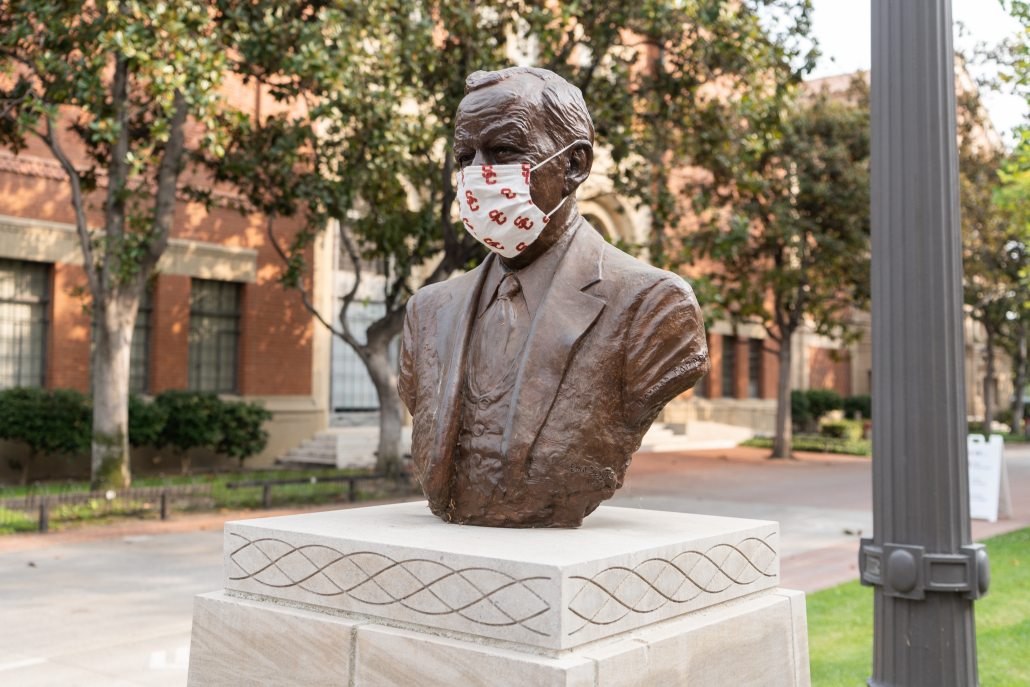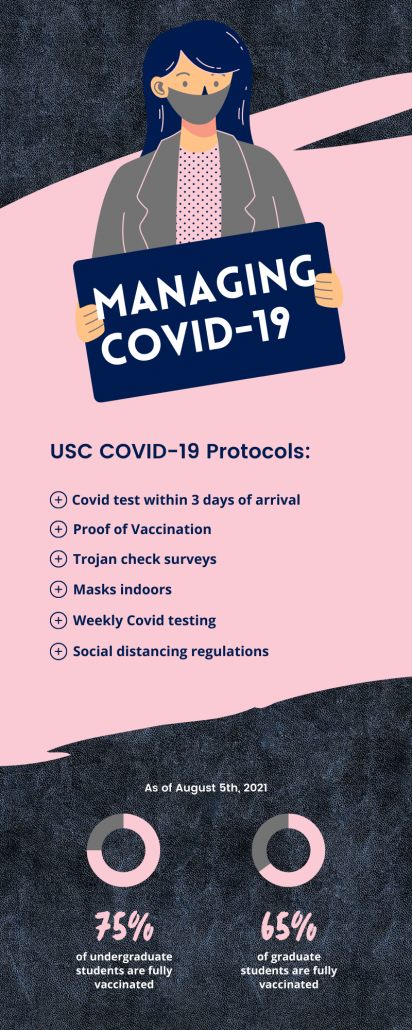USC prepares return to the classroom

Editor’s note: This story will be updated online as announcements from the University and individual schools become available. The following story includes updates as of Aug. 13.
As Clint Wu plans to move to USC’s campus for the first time after more than a year of disruption to his traditional educational experience, he looks forward to meeting people in-person. Instead of attending classes between 11 p.m. to 5 a.m. from his room in Hong Kong and meeting peers through small Zoom windows that prevented him from developing meaningful relationships, Wu — like many other USC students — expects to find opportunities on campus that he found limited in the online setting.
“It’s already been a year of online classes, and I really want to experience [an] on-campus, traditional college lifestyle,” said Wu, a sophomore majoring in business administration. “As an international student, I paid full tuition, so it doesn’t make sense for me to be paying this much for online [classes].”
Nearly 18 months since USC shifted to online learning, USC plans to “return to the full breadth of in-person academic, research, clinical, and service activities,” President Carol Folt wrote in a communitywide email Aug. 5.
In Chief Health Officer Dr. Sarah Van Orman’s most recent community update Aug. 2, she announced that students arriving in Los Angeles will need to take a coronavirus test within three days of arrival or by Aug. 22. Beginning Sunday, Trojan Checks, a daily coronavirus symptom questionnaire that verifies up to date testing and vaccination requirements and that is necessary to enter campus, will require the completion of “Hygiene, Health and Safety,” an online module located on TrojanLearn.

All students, faculty and staff are required to wear masks indoors at all campus facilities, regardless of vaccination status. The decision followed the rise of Delta variants in L.A. County early-July and the alike mask mandate issued by the county.
Of the 15 schools from which the Daily Trojan requested Fall 2021 coronavirus guidelines, six schools shared their plans, including the Gould School of Law and the School of Dramatic Arts. Media representatives from the Leonard Davis School of Gerontology and the Glorya Kaufman School of Dance responded that each school will follow University guidelines. The Dornsife College of Letters, Arts and Sciences referred the Daily Trojan to USC’s Central Communications. Six schools — including the Thornton School of Music and the Annenberg School for Communication and Journalism — did not respond to phone and email requests.
While all schools are required to comply with University regulations, some will make necessary course adjustments to serve the needs of all students.
In a July 20 email, Viterbi School of Engineering Dean Yannis Yortsos confirmed that, while the University expects an on-campus return, the individual school will offer nearly all Fall 2021 Viterbi courses “for both in-person and remote attendance.” In an interview with the Daily Trojan July 26, Yortsos said he believes doctorate and specialized courses will be offered in-person.
For over 20 years, Viterbi has offered master’s courses online through its distance education network program, DEN@Viterbi, Yortsos said. The school’s decision to extend their online class offerings is intended to accommodate students who may be ill or who cannot attend campus for any other reason.
“We did receive some comments, some reactions from some students overseas that they were worried that they may not be able to come to campus because of visa issues related to travel restrictions,” Yortsos said. “That’s why we wanted to make sure we accommodate them just like we accommodated last year.”
In a July 28 letter to Marshall School of Business undergraduate students, Marshall Vice Dean for Undergraduate Programs Ramandeep Randhawa confirmed courses will take place in-person, with the exception of students who are overseas or who have medical needs. Students who have medical needs must reach out to USC’s Office of Student Accessibility Services, and students overseas must sign an online petition.
The Rossier School of Education will hold classes in the Waite Phillips Hall building because the building’s air flow complies with L.A. County Department of Public Health guidelines to reduce virus transmission.
The USC Gould School of Law intends for students to show their Trojan Check verification before entering the law building beginning Aug. 16. Any student who requires an accommodation would need to contact the personnel office.
The School of Dramatic Arts intends to comply with L.A. County Department of Public Health and University guidelines while continuing to perform by offering students clear masks to wear in voice lessons and rehearsals, Vice Dean of Academic & Administrative Affairs Lori Ray Fisher said in an interview with the Daily Trojan Aug. 11.
In an Aug. 11 letter, Roski School of Art and Design Dean Haven Lin-Kirk informed its students about the school’s plan to hold in-person events such as a picnic, an art festival with live performances and a “hands-on” workshop. The letter further emphasized that students would enter an upgraded Watts Hall with safety improvements such as better ventilation systems and touchless faucets.
Scott Macdonald, adjunct assistant professor of physics and astronomy, will teach four physics classes in the fall semester — three in-person and one on Zoom. Macdonald said that those who attend his in-person classes will abide by the guidelines issued by the University.
“I’m perfectly comfortable to lecture with a mask on,” Macdonald said. “They have microphones I can plug to my lapel or even to my mask to help project my voice so it’s not too muffled. Students will be asked to keep masks on at all times. If they want to take a sip of water or something like that they can briefly pull it down to take a sip of water, but I’m going to ask that they keep it on for the duration of the lecture.”
Oscar Escobar, a junior majoring in aerospace engineering, said he feels comfortable about returning to in-person classes despite his concerns traveling from his home country, Mexico, to California. Escobar, who said he was depressed from taking classes online for a long period, finds attending classes in-person as his best option.
“I’ll be taking up classes in person if I can,” Escobar said. “It’s very hard to get focused in your bed or in your bedroom or in your house, so going in person is way easier for me.”
Upon registering for classes, Escobar did not know about the status of his classes in regards to whether they will be hybrid or not.
Angela Hernandez, a senior majoring in Middle East studies, plans to come to campus for the first time as a transfer. However, as a result of the increased infection rate of the Delta virus and the presence of potential unvaccinated students, she said she would not mind taking online classes.
“I’m really nervous because the transition to online was so hectic and weird,” Hernandez said. “Being in person, it’s just getting used to the new normal and [entering] a new school is pretty nerve racking for me.”
For Lucy Warren, a senior majoring in economics and the vice president of the Undergraduate Student Government, the University’s mask mandate made her feel “a lot more comfortable being on campus.”
“Just navigating the medical system throughout COVID has been incredibly challenging, and I’m sure a lot of others can relate,” said Warren, who is immunocompromised. “But we were very cautious at home as well. I live with two other immunocompromised family members, and so we just locked down truly [and] did not go anywhere in public.”
While Warren has the same plans to return to campus “as every other student,” she still has concerns.
“[Returning to campus is] just going to be so thrilling with thousands of people coming back together, and there’s just going to be an energy that’s electric when we return, and we see everybody,” she said. “But also, to be quite frank, [I’m] very, very scared … You’re not able to really know [if the] person that I’m in class with [is] vaccinated.”
Dr. Jeffrey Klausner, clinical professor of population and public health sciences, said he believes USC is ensuring the appropriate conditions for a safe return. As a former Centers for Disease Control medical officer and a member of the USC COVID-19 Pandemic Research Center, he helped provide the University with information on the best public health practices by conducting research on vaccine development.

“We have to be concerned if there’s additional variants that may be brought in, so we’ve been working with the University, using our research and other expertise to really make sure we have a good monitoring program, and that, as best we can, we can easily detect current variants and new variants,” Klausner said. “The good news is that, if one is vaccinated, the vaccines still are highly protective against all the variants that we’ve seen. The vaccines are 95% or more protective against serious disease, hospitalization and death.”
Klausner said everyone would need to comply with the University policy and follow classroom size limitations. With the Delta virus at hand, he said the USC community should expect little ongoing transmission once the University’s community immunity rate is at or higher than 90%.
Mark Schroeder, a professor of philosophy, intends to adjust his classroom setting after he receives the confirmed list of students signed up for his course. Schroeder said he understands the various sentiments students feel in regard to the way they will take their classes for the upcoming academic year.
“I think that every student has had different experiences and also has different needs,” he said. “I think that it’s appropriate for students to have very different reactions and hopes and expectations, and the problem is that the way that things work is always a compromise between what benefits different people to different degrees.”
Warren believes that the University has taken a proper approach in regard to expecting over 40,000 students. She, though, sees the pandemic as ever-changing and impacting the plans of the University.
“I think the University has been really smart, in the way that they’ve handled it this summer in the phases that we’ve taken,” she said. “Unfortunately we just cannot predict this pandemic, and they are really doing their best to just stay on their toes and stay informed and continue planning for [the] best case scenario.”

